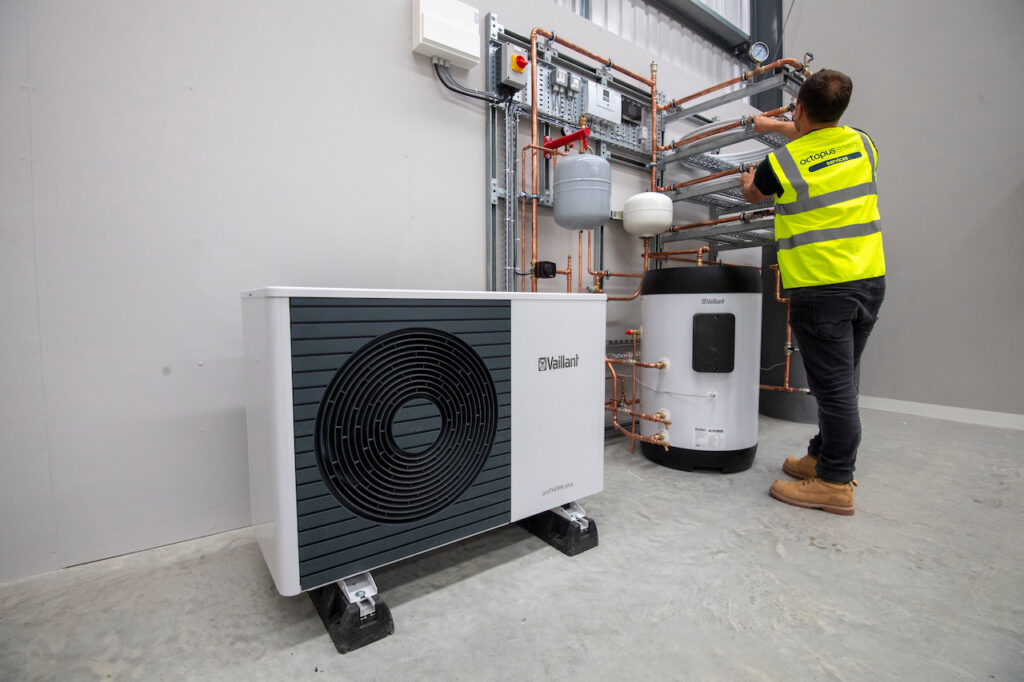The National Audit Office (NAO) has released a report on the progress of the Department for Energy Security and Net Zero on deploying heat pumps to decarbonise home heating.
The NAO said that DESNZ has become reliant on “optimistic assumptions about customer demand” to achieve the UK government’s ambition of 600,000 annual installations by 2028.
This ambition was first set in the government’s Heat and Buildings Strategy, published in October 2021, alongside the goal of ending the installation of new fossil fuel boilers by 2035.
Two avenues were paved for DESNZ and the Department for Levelling Up, Housing & Communities (DLUHC) to achieve these goals.
One was the development and launch of the Boiler Upgrade Scheme (BUS), which provides households in England and Wales, with an up-front grant to help cover the cost of replacing fossil fuel heating systems with a heat pump or biomass boiler.
The other was researching the potential of hydrogen’s role in home heating, and the departments are due to make a decision on the matter in 2026.
The role of BUS
Launched in April 2022, the BUS initially offered grants of £5,000 to incentivise English and Welsh citizens to start using low-carbon heating technology, such as air source heat pumps.
The scheme funded the installation of nearly 18,900 heat pumps in England and Wales from May 2022 to December 2023. However, it had originally budgeted for up to 50,000 installations by this point.
In September 2023, the UK’s prime minister, Rishi Sunak, announced a 50% uplift to the grant, bringing it from £5,000 to £7,500, which had a significantly positive impact in terms of uptake.
This meant it now covers nearly 60% of the average cost of installing a heat pump, based on the average cost in 2023.
According to the NAO’s report, the number of applications to the scheme in December 2023 increased by nearly 50% compared with December 2022, and applications in January 2024 increased by nearly 40% compared with January 2023.
The report also outlined that DESNZ, along with DLUHC, has developed plans for further measures aimed at increasing heat pump uptake, citing the Clean Heat Market Mechanism (CHMM) as an example.
However, DESNZ announced last week (March 15) that the scheme, which would require heat pump installations to make up 4% of boiler manufacturer sales in the first year and 6% in the mechanism’s second year, will be delayed until 2025.
The NAO said that the BUS is helping reduce heat pump installation costs, but “more slowly than DESNZ hoped”.
This, coupled with the fact that DESNZ currently has no plans for financial incentives around running costs for heat pumps, as well as delays to the CHMM, highlights that the department is behind in reaching its goals.
Hydrogen’s involvement
The NAO report reveals that certain aspects of DESNZ’s plans to test the feasibility of hydrogen for home heating are behind schedule or have been cancelled, meaning there will be less evidence to make decisions in 2026 on the role of hydrogen.
For example, DESNZ is no longer proceeding with supporting a village trial that it originally planned for 2025 because there were issues with identifying a local hydrogen supply.
In October 2023, the National Infrastructure Commission, which advises the government on major long-term infrastructure challenges, recommended that the government should not support hydrogen for home heating.
However, the government maintained that DESNZ should still establish an evidence base, and the department is currently developing an appraisal framework for making its 2026 decisions.
Industry comments
Jess Ralston, energy analyst at the Energy and Climate Intelligence Unit (ECIU), said the report details a “sorry saga” of government efforts.
She said: “Some of these spring from a failure to act, for example, by not promoting the Boiler Upgrade Scheme to homeowners or rebalancing levies from electricity to gas bills.
“Others come from dithering and U-turns by Number Ten, such as the move to delay the CHMM, which only benefits the big boiler manufacturers and keeps the UK reliant on gas for longer.”
Katrina Young, practice manager for heat policy and local energy at Energy Systems Catapult, said: “Policy support has historically been focused on reducing up-front costs associated with heat pumps and insulation. While important, other barriers – such as reducing the running costs of electrified heating compared to a gas boiler – will hold us back.”
“The rebalancing of policy levies and charges on electricity and gas bills is crucial to incentivise low carbon heating technologies.”
Ralston concluded: “Industry, consumer groups and now government advisors are all urging the government to learn from its mistakes, develop a clear long-term policy to correct them, and stand up to lobbying from the incumbent gas industry if there is to be any hope of turning this progress around.”






